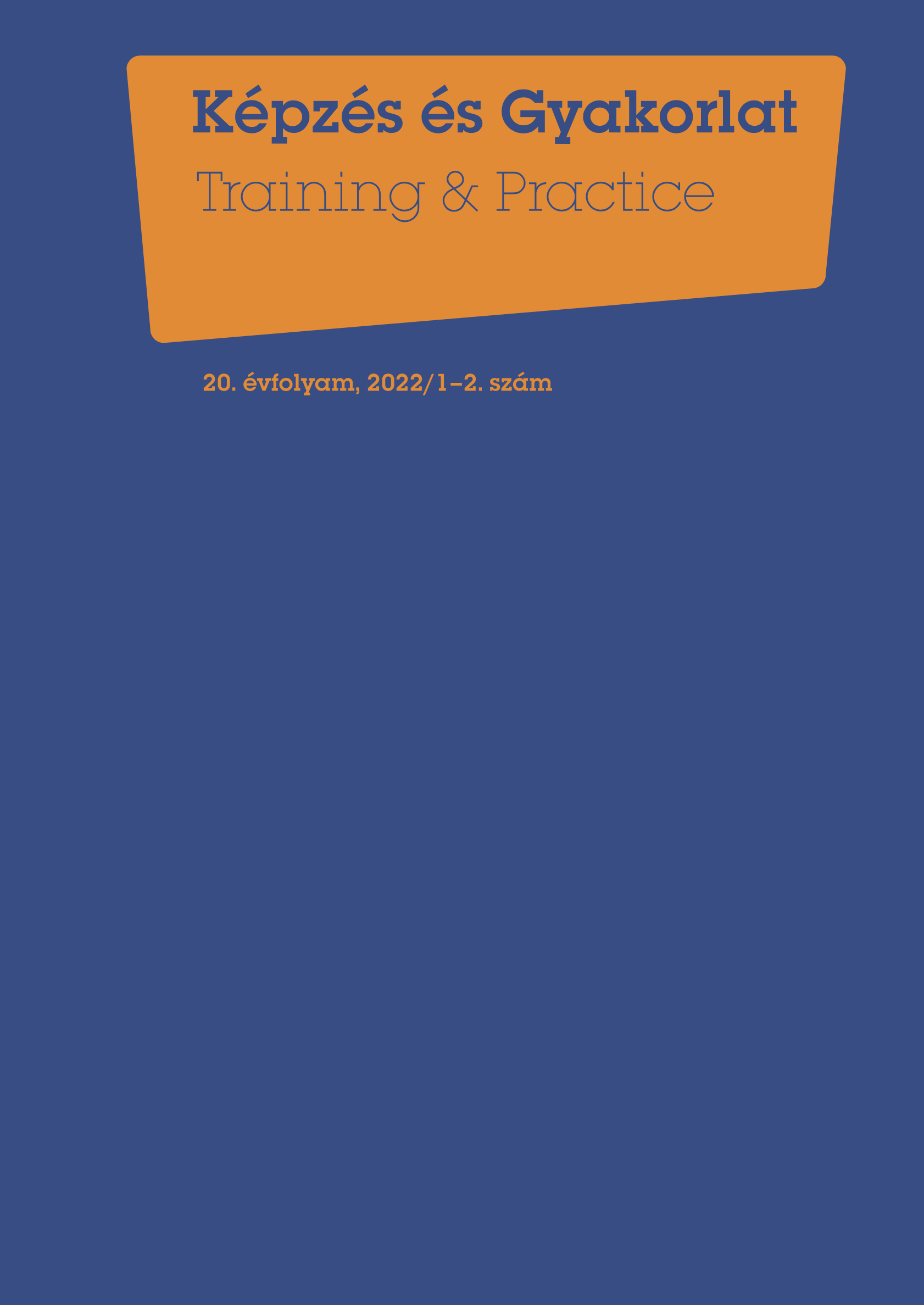Az elektorenkefalográfia alkalmazása az oktatásban
DOI:
https://doi.org/10.17165/TP.2022.1-2.2Absztrakt
Elektorenkefalográfiával (EEG) a kognitív folyamatok jó időbeli felbontással követhetők, a hordozható készülékek valós környezetben történő adatrögzítést is lehetővé tesznek. A regisztrátumok értelmezéséhez azonban vizsgálni kell, hogy a laboratóriumi körülmények között feltárt EEG jellemzők érvényesülnek-e komplex környezeti hatások mellett. Három különböző nehézségű feladat közben rögzítettük egyetemisták EEG aktivitását, a feladatok eredményét és a résztvevők szubjektív értékelését. A regisztrátumok nagyfokú egyéni variabilitást mutattak, ráadásul az egyéb hatásokra (például kialvatlanság) adott válaszok akár ellentétesek is lehettek, de a figyelem és az alfa aktivitás jellemzői elvárásainknak megfelelően változtak. A feladatok eredményére egyik EEG jellemző se utalt megbízhatóan. Az EEG-t a tanulási folyamat értékelésére egyéb pedagógiai értékelő módszerekkel kiegészítve érdemes alkalmazni.
Hivatkozások
Ahn, J. W., Ku, Y., Kim, H. C. (2019). A Novel Wearable EEG and ECG Recording System for Stress Assessment. Sensors, Vol. 19. No. 9. 1991. DOI: https://doi.org/10.3390/s19091991
Angelidis, A, van der Does, W, Schakel, L, Putman, P. (2016). Frontal EEG theta/beta ratio as an electrophysiological marker for attentional control and its test-retest reliability. Biol Psychol, Vol. 121. Part A, pp. 49‒52. DOI: https://doi.org/10.1016/j.biopsycho.2016.09.008
Barry, R. J., Clarke, A. R., Johnstone, S. J., Magee, C. A., Rushby, J. A. (2007) EEG differences between eyes-closed and eyes-open resting conditions. Clin. Neurophysiol. Vol. 118. évf. No. 12. pp. 2765‒73. DOI: https://doi.org/10.1016/j.clinph.2007.07.028
Benchenane, K., Tiesinga, P. H., Battaglia, F. P. (2011). Oscillations in the prefrontal cortex: a gateway to memory and attention. Current Opinion in Neurobiology, Vol. 21. No. 3. pp. 475–485. DOI:https://doi.org/10.1016/j.conb.2011.01.004
Booth, B. M., Seamans, T. J., Narayanan, S. S. (2018). An Evaluation of EEG-based Metrics for Engagement Assessment of Distance Learners. 40th Annual International Conference of the IEEE Engineering in Medicine and Biology Society (EMBC), 2018 pp. 307‒310. DOI: https://doi.org/10.1109/EMBC.2018.8512302
Dikker, S., Wan, L., Davidesco, I., Kaggen, L., Oostrik, M., McClintock, J, Rowland, J, Michalareas, G, Van Bavel, J. J., Ding, M., Poeppel, D. (2017). Brain-to-Brain Synchrony Tracks Real-World Dynamic Group Interactions in the Classroom. Curr Biol. Vol. 27. No. 9. pp. 1375‒1380. DOI: https://doi.org/10.1016/j.cub.2017.04.002
Gevins, A., Smith, M. E., McEvoy, L., Yu, D. (1997). High-resolution EEG mapping of cortical activation related to working memory: effects of task difficulty, type of processing, and practice. Cerebral Cortex, Vol. 7 No. 4. pp. 374–385. DOI: https://doi.org/10.1093/cercor/7.4.374
Jaquess, K. J., Lo, L. C., Oh, H., Lu, C., Ginsberg, A., Tan, Y. Y., Lohse, K. R., Miller, M. W., Hatfield, B. D., Gentili, R. J. (2018). Changes in Mental Workload and Motor Performance Throughout Multiple Practice Sessions Under Various Levels of Task Difficulty. Neuroscience, Vol. 393. pp. 305–318. DOI: https://doi.org/10.1016/j.neuroscience.2018.09.019
Jones, E., Travis, O., Pearu. P. (2001). SciPy: Open Source Scientific Tools for Python. http://www.scipy.org/
Klimesch, W. (1997). EEG-alpha rhythms and memory processes. International journal of psychophysiology : official journal of the International Organization of Psychophysiology, Vol. 26. No. 1‒3. pp. 319–340. DOI: https://doi.org/10.1016/s0167-8760(97)00773-3h
Marin, I. (2021). Study of mental health and learning engagement during COVID-19 pandemic based on an electroencephalogram headset. In: Chova, L.G. – Martinez, A.L. – Torres, I.C.(ed.): ICERI2020 Proceedings, (pp. 7734-7738), IATED Academy
R Core Team (2021). R: A language and environment for statistical computing. R Foundation for Statistical Computing, Vienna, Austria.
Schmidt, E. A., Schrauf, M., Simon, M., Fritzsche, M., Buchner, A., Kincses, W. E. (2009). Drivers' misjudgement of vigilance state during prolonged monotonous daytime driving. Accident; analysis and prevention, Vol. 41. No. 5. sz. pp. 1087–1093. DOI: https://doi.org/10.1016/j.aap.2009.06.007
Smit, D. J., Posthuma, D., Boomsma, D. I., Geus, E. J. (2005). Heritability of background EEG across the power spectrum. Psychophysiology, Vol. 42. No. 6., pp. 691–697. DOI: https://doi.org/10.1111/j.1469‒8986.2005.00352.x
van Son, D., De Blasio, F. M., Fogarty, J. S., Angelidis, A., Barry, R. J., & Putman, P. (2019). Frontal EEG theta/beta ratio during mind wandering episodes. Biological psychology, Vol. 140, pp. 19–27. DOI: https://doi.org/10.1016/j.biopsycho.2018.11.003
Steriade, M., Gloor, P., Llinás, R. R., Lopes de Silva, F. H., Mesulam, M. M. (1990). Report of IFCN Committee on Basic Mechanisms. Basic mechanisms of cerebral rhythmic activities. Electroencephalogr. Clin. Neurophysiol. Vol. 76. pp. 481–508. DOI: https://doi.org/10.1016/0013-4694(90)90001-Z
Stevelink, R., Luykx, J. J., Lin, B. D., Leu, C., Lal, D., Smith, A. W., Schijven, D., Carpay, J. A., Rademaker, K., Rodrigues Baldez, R. A., Devinsky, O., Braun, K., Jansen, F. E., Smit, D., Koeleman, B., (2021). International League Against Epilepsy Consortium on Complex Epilepsies, & Epi25 Collaborative. Shared genetic basis between genetic generalized epilepsy and background electroencephalographic oscillations. Epilepsia, Vol. 62. No. 7. pp. 1518–1527. DOI: https://doi.org/10.1111/epi.16922
Tinga, A. M., de Back, T. T., Louwerse, M. M. (2019). Non-invasive neurophysiological measures of learning: A meta-analysis. Neuroscience and Biobehavioral Reviews, Vol. 99, pp. 59–89. DOI: https://doi.org/10.1016/j.neubiorev.2019.02.001
Ward L. M. (2003). Synchronous neural oscillations and cognitive processes. Trends in Cognitive Sciences, Vol. 7. No. 12. pp. 553–559. DOI: https://doi.org/10.1016/j.tics.2003.10.012
Letöltések
Megjelent
Folyóirat szám
Rovat
License
Copyright (c) 2022 Emri Zsuzsa, Antal Károly

This work is licensed under a Creative Commons Attribution-NonCommercial-NoDerivatives 4.0 International License.












